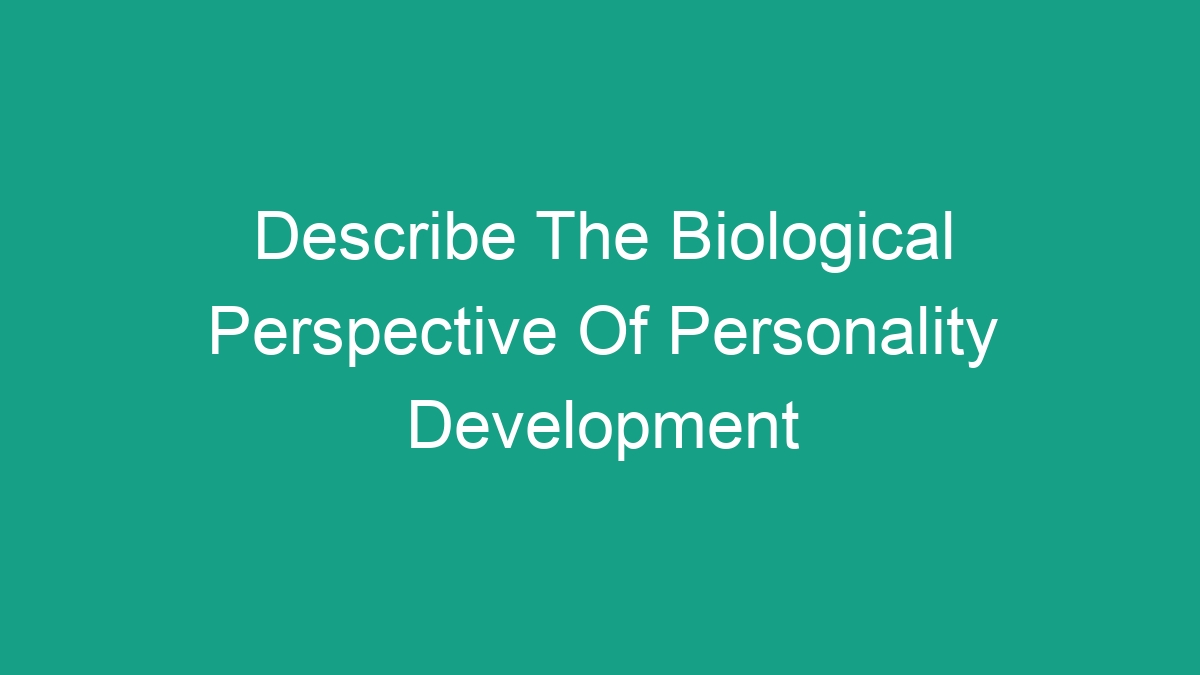
Personality development has long been a topic of interest for psychologists and researchers. Understanding how and why individuals develop their unique personality traits is essential for gaining insight into human behavior and cognition. Among the many psychological perspectives on personality development, the biological perspective offers a valuable framework for understanding how genetic and physiological factors influence the development of personality traits.
The Role of Genetics
Genetics play a significant role in shaping an individual’s personality. Research has consistently demonstrated that certain personality traits, such as introversion-extraversion and neuroticism, have a heritable component. Studies of twins and adopted siblings have provided valuable insights into the heritability of personality traits, with genetic factors estimated to account for approximately 40-60% of individual differences in personality.
Specific genes have been implicated in the development of certain personality traits. For example, the serotonin transporter gene (5-HTT) has been associated with neuroticism and vulnerability to stress, while the dopamine receptor D4 (DRD4) gene has been linked to novelty-seeking behavior and sensation seeking. These genetic influences interact with environmental factors to shape an individual’s personality development.
Neurobiological Basis of Personality
From a biological perspective, personality is closely linked to the functioning of the brain and nervous system. Neurobiological research has identified brain regions and neurotransmitter systems that are involved in the regulation of personality traits. For example, the prefrontal cortex, which is responsible for executive functioning and decision-making, has been associated with traits such as conscientiousness and impulse control.
Neurotransmitters such as serotonin, dopamine, and norepinephrine have also been implicated in the development of personality traits. For instance, low levels of serotonin have been linked to impulsivity and aggression, while dopamine has been associated with reward-seeking behavior and sensation seeking. The interplay between these neurotransmitter systems and personality traits highlights the neurobiological basis of personality development.
Hormonal Influences
Hormones also play a role in shaping personality development. The endocrine system, which regulates the production and release of hormones, has been linked to the development of certain personality traits. For example, testosterone has been associated with dominance, aggression, and risk-taking behavior, while estrogen has been linked to empathy and social behavior.
Studies have shown that hormone levels can influence the expression of personality traits, particularly during critical periods of development such as puberty. The impact of hormonal changes on behavior and personality underscores the biological underpinnings of personality development.
Early Brain Development
Early experiences and environmental influences also play a crucial role in shaping personality development through their impact on brain development. Research has shown that early experiences, such as caregiving and attachment relationships, can have long-lasting effects on the structure and function of the brain, as well as on the development of personality traits.
For example, children who experience secure attachments and responsive caregiving are more likely to develop traits such as trust, empathy, and emotional resilience. On the other hand, adverse early experiences, such as neglect or abuse, can lead to disruptions in brain development and an increased risk for the development of personality disorders and maladaptive traits.
Environmental Interactions
While the biological perspective emphasizes the role of genetic and physiological factors in personality development, it is important to recognize the interaction between biological and environmental influences. The field of epigenetics explores how environmental factors can influence the expression of genes and their impact on personality development.
Environmental factors such as family dynamics, peer relationships, cultural influences, and socioeconomic status can shape the expression of genetic predispositions and contribute to the development of personality traits. For example, a supportive and nurturing environment can mitigate the impact of genetic vulnerabilities, leading to positive personality outcomes, while a hostile or stressful environment can exacerbate the expression of maladaptive traits.
Implications for Understanding and Intervening
The biological perspective of personality development has important implications for understanding individual differences in personality and for informing interventions aimed at promoting healthy personality development. By recognizing the complex interplay of genetic, neurobiological, hormonal, and environmental factors, psychologists and mental health professionals can gain insights into the origins of personality traits and disorders.
From a clinical standpoint, understanding the biological underpinnings of personality can inform the development of tailored interventions and treatment approaches. For example, individuals with certain genetic predispositions or neurobiological vulnerabilities may benefit from targeted interventions that address specific biological mechanisms underlying their personality traits or disorders.
Furthermore, the biological perspective underscores the importance of early intervention and prevention efforts to promote healthy personality development. By addressing early environmental factors and providing supportive experiences during critical developmental periods, mental health professionals can work to mitigate the impact of genetic and biological vulnerabilities and promote positive personality outcomes.
Conclusion
In conclusion, the biological perspective of personality development provides a valuable framework for understanding the complex interplay of genetic, neurobiological, hormonal, and environmental factors in shaping individual differences in personality. By recognizing the biological underpinnings of personality, psychologists and researchers can gain important insights into the origins of personality traits and disorders, as well as inform tailored interventions and prevention efforts to promote healthy personality development.
Ultimately, the integration of biological, psychological, and social perspectives is essential for gaining a comprehensive understanding of personality development and for promoting mental health and well-being across the lifespan.



